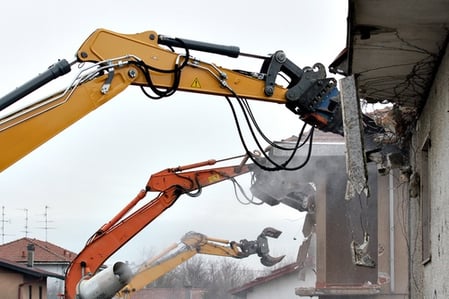NYC Noise Code: Are Your Construction Projects Compliant?

Given the high population density of New York City, an uncontrolled source of noise has the potential to affect many homes and businesses. The effects of noise can range from disturbing neighbors during sleep hours, to reduced productivity in office settings. Consider that noise often comes with vibration, which can also be disruptive, while having the potential to damage sensitive equipment. While having some ambient noise in “the city that never sleeps” is reasonable, it must be kept under control for NYC to remain a suitable place for living, tourism and business.
Noise control requirements are established in the NYC Noise Code, and depending on the case they are enforced by the Department of Environmental Protection (DEP) or the Police Department (NYPD). For real estate developers, property management companies and contractors, the most relevant requirements are those dealing with new constructions and noise sources in existing buildings.
Noise Complaints in NYC
In 2017 there were more than 446,000 noise complaints in NYC, most of them received through 311. These complaints are far less common during the winter, when weather conditions are often unsuitable for construction. Although most complaints are due to loud music and parties, noisy construction projects are also reported frequently.
Complaints associated with construction are handled by the NYC Dept. of Environmental Protection, and penalties can range from $50 to $24,000. The DEP also has the authority to stop any work that is producing excessive noise, until the contractor deploys adequate abatement measures.
The NYC Noise Code is established in Local Law 113 of 2005. In addition, the code was amended by the NYC council in May 2018, lowering the allowed noise levels for after-hours and weekends. The noise limit within 200 feet of a residence is currently 85 decibels, but it will be reduced to 80 dB in 2019 and 75 dB in 2020. Note that the decibel scale is logarithmic, which means sounds become twice as loud for every 10 dB increase - a reduction from 85 dB to 75 dB may seem small numerically, but it is actually 50% less loud. According to the National Institutes of Health, sustained noise at 85 dB or higher causes hearing loss over time.
Noise Management in Construction
Although construction activity is always noisy, many types of equipment are notorious for the loud sounds they produce. Some examples are air compressors, pile drivers, sledgehammers, pneumatic tools, steam shovels, hoisting equipment, pumps and power tools.
For contractors, the NYC Noise Code establishes mitigation measures such as low-noise mufflers and portable barriers with sound insulation. The code also requires noise mitigation plans, according to the following guidelines:
- The plan must be written before starting construction work, and every project must have the corresponding plan on-site.
- When there is a noise complaint, the inspector (DEP or NYPD) will verify that the plan is available on-site and being followed correctly. If this is the case, and there complaints anyway, modifications to the plan are requested.
- For projects close to noise-sensitive locations like schools, hospitals and places of worship, the noise mitigation plan must be designed to accommodate the needs of these buildings.
Two types of construction sounds are strictly forbidden: Noise exceeding ambient sounds by more than 10 dB at 15 feet from the source, and impulsive sounds - those having high intensity and short duration.

It is important to note that even a minor reduction in decibel levels can have a noticeable effect on neighbor comfort. According to the NYC DEP, a reduction of only 5 dB tends to eliminate most complaints.
There are also schedule requirements for construction projects, with some exceptions depending on the type of work:
- The general schedule for construction is between 7:00 AM and 6:00 PM on weekdays.
- Reparations and alterations are allowed in some types of residential dwellings between 10:00 AM and 4:00 PM on weekends, if there is no house of worship within 300 feet.
- Outside of the approved schedules, construction work is only allowed with direct authorization from the Dept. of Buildings and Transportation. The corresponding noise mitigation plan must be developed before requesting permission.
- Emergency work that involves public safety is allowed at any time. For example, if there is a gas or steam leak, it must be fixed as soon as possible.
- Work that is impossible to perform within the established schedule is also allowed during after-hours or weekends.
Noise Management in Existing Buildings
In existing buildings, poorly-serviced air conditioners are among the most common sources of noise. Surrounding streets and buildings are normally affected, due to the presence of outdoor condensers on walls and rooftops. Ventilation equipment can also become very noisy if it lacks adequate maintenance.
According to the NYC Noise Code, the sound from a single AC or ventilation device must not exceed 42 dB when measured three feet from the source, in the direction of the closest door or window from an adjacent property. For multiple devices, the combined noise is limited to 45 dB.
Businesses that play music are subject to an additional noise management measure, where they must keep sound levels below the two following limits:
- 42 dB, when measured from within surrounding residences.
- 7 dB above ambient noise, measured at 15 feet from the source, from 10:00 PM to 7:00 AM.
If your property has green areas, there are also schedules for lawn mowers and leaf blowers:
- Weekdays: 8:00 AM to 7:00 PM or sunset, whichever comes later.
- Weekends and holidays: 9:00 AM to 6:00 PM.
Final Recommendations
Many noise sources in ongoing constructions and existing buildings can be mitigated with adequate design and planning. Noise from HVAC equipment can be reduced significantly with properly selected equipment bases, and their location within a building can be specified away from workspaces and dwellings.
Like with many other construction laws in NYC, noise prevention is cheaper and simpler than correcting issues once they emerge. Having a project stopped due to noise can have expensive consequences such as missed deadlines, and making adjustments to installed AC units is more complex than preventing noise and vibration from the design phase.

Michael Tobias
Michael Tobias, the Founding Principal of NY Engineers, currently leads a team of 150+ MEP/FP engineers and has led over 4,000 projects in the US
Join 15,000+ Fellow Architects and Contractors
Get expert engineering tips straight to your inbox. Subscribe to the NY Engineers Blog below.
